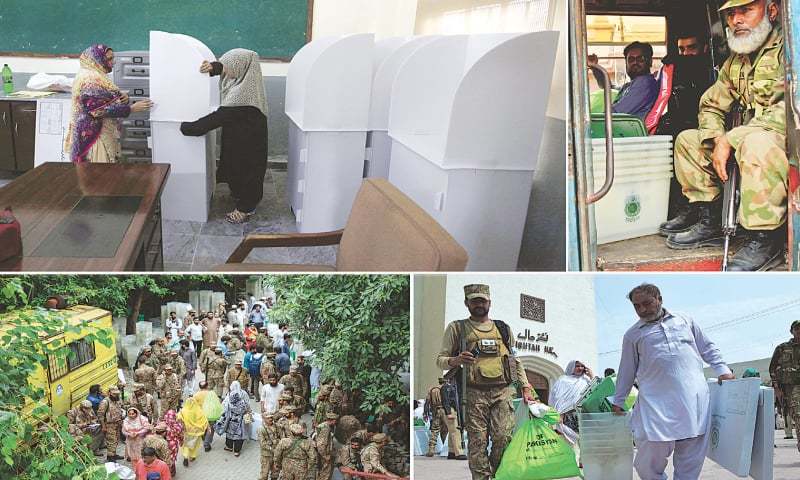
ISLAMABAD: As the nation goes to polls today (on Wednesday), the Election Commission of Pakistan (ECP) is optimistic about a record turnout of voters.
“We expect to see a record turnout of voters due to the increased level of awareness about importance of vote,” ECP Secretary Babar Yaqoob Fateh Muhammad said at a media briefing a day before the elections.
Though he did not present the estimated turnout, his optimism meant it is expected to be greater than 55 per cent turnout of the 2013 general elections, including valid and non-valid votes. The 2013 turnout was the highest in the federal capital territory (62.29 pc), followed by Punjab (58.38 pc), Sindh (51.58 pc), Khyber Pakhtunkhwa (44.64 pc) and Balochistan (38.97 pc).
Read: Nation’s tryst with destiny today
The ECP secretary said out of the total 849 national and provincial assembly constituencies, polling would take place in 840 constituencies — 270 of the 272 National Assembly constituencies and 570 of the 577 provincial assembly constituencies.
Independent candidates outnumber the candidates fielded by political parties
He said polling in most of the nine constituencies had been postponed due to death of contesting candidates, with the exception of NA-60 where polling had been deferred due to disqualification of Pakistan Muslim League-Nawaz candidate Hanif Abbasi.
In all 11,673 candidates are in the run, 3,428 for National Assembly and 8,245 for provincial assembly seats.
The statistics shared with the media reveal that independent candidates outnumber the candidates fielded by political parties. The number of candidates fielded by parties is 5,661 while the number of independent candidates in the race is 6,012.
For National Assembly seats, 1,623 candidates are in the race, 1,805 of them fielded by political parties and 1,623 independents. KP is the only province where the number of independent candidates for National Assembly seats is higher than those fielded by parties.
For National Assembly seats, parties have fielded 820 candidates in Punjab, 441 in Sindh, 335 in KP, 173 in Balochistan and 36 in the federal capital. The number of independent candidates for National Assembly seats includes 714 from Punjab, 373 from Sindh, 386 from KP, 117 from Balochistan and 33 from the federal capital.
For provincial assembly seats, 8,245 candidates are in the run, 3,856 fielded by parties and 4,389 contesting independently. The number of independent candidates is higher for Punjab and Sindh assemblies than the party ticket holders. As many as 2,256 independents and 1,719 party ticket holders are contesting Punjab Assembly seats while 1,186 independents and 993 party candidates are in the run for Sindh Assembly seats. In KP and Balochistan there are 675 and 469 party ticket holders and 470 and 477 independents, respectively.
Of the 120 parties enlisted with the ECP, 95 are contesting elections and seven of these 95 parties have failed to meet the mandatory requirement of awarding five per cent party tickets for general seats to women.
A total of 8,508 polling stations and 244,687 polling booths have been established across the country. As many as 40,632 of the polling stations are combined and there are 23,104 male and 21,322 female polling stations. As many as 17,007 polling stations have been declared highly sensitive.

VOTERS: There are 105,955,409 registered voters, including 59,222,927 male, 46,730,569 female voters besides 1,913 transgender voters, of whom 1,356 are in Punjab alone.
The data shows that 17,443,094 voters forming over 10 per cent of the total are in the age bracket of 18-25 years. This means they will be exercising their right to franchise for the first time. Another 28,995,231 voters are aged between 26 and 35 years.
As many as 215,527 of the voters are suffering from physical disabilities, 163,995 of them male and 52,432 female. The ECP has announced the people with disabilities would be able to avail the postal ballot facility and those who choose to go to polling stations should be allowed to vote on priority basis, without making them to wait in the queue. The ECP has trained polling staff to sensitively deal with such voters.
The total number of voters belonging to religious minorities comes to 3,362,016, which includes 1,864,800 male and 1,497,216 female voters.
Meanwhile, Chief Election Commissioner (CEC) retired Justice Sardar Muhammad Raza has assured voters that the ECP is trying its best to hold free, fair and unbiased elections.
In a video message released by the ECP on Tuesday, he urged voters to fulfill their “duty towards the nation” by casting their votes responsibly.
Over the past few days, the ECP has released multiple notifications for voters, polling staff and political parties, explaining what to do and what not to do on the polling day.
On Monday, the election body issued a list of requirements that a ballot paper would have to meet in order to be included in the counting process. Ballot papers that are missing the official code mark or assistant presiding officer’s signature or have a paper attached to them will not be considered valid.
Asking a voter who he/she votes for, spoiling ballot papers or stamps in any way and taking a picture of ballot paper are some of the actions that would land the offender in jail for up to three months and result in fines up to Rs100,000, or both, according to an ECP notification.
Published in Dawn, July 25th, 2018













































